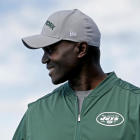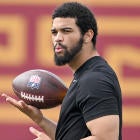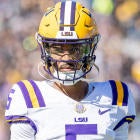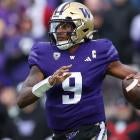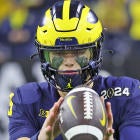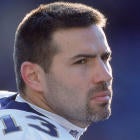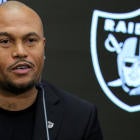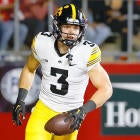Just 10 days ago, New York Jets agreed to send three second-round picks to the Indianapolis Colts in exchange for the right to move up three spots from No. 6 to No. 3 in the first round of next month's NFL draft. It is widely assumed that the Jets moved up in order to ensure they got themselves one of the draft's top quarterbacks, which was not necessarily a guarantee if they stayed at No. 6.
Speaking at this week's owners meetings in Orlando, Florida, Jets coach Todd Bowles was asked about the trade and, well, he said something that makes the deal look pretty strange in hindsight.
#Jets coach Todd Bowles, at the annual coaches breakfast, said they traded up to No. 3 not with one player in mind but with 6-7 they believe they’ll have a chance at. Will zero in in a few weeks.
— Ian Rapoport (@RapSheet) March 27, 2018
Bowles says they have "six or seven" players worthy of the No. 3 pick. #Jets
— Rich Cimini (@RichCimini) March 27, 2018
... OK?
If there are six or seven players you believe are worthy of the No. 3 pick, and you have the No. 6 pick ... then it stands to reason that you're going to get very good value at No. 6. And that there's not much reason to surrender three second-rounders in order to move up three spots in order to pick a player that you think has approximately the same value as one you could get at your original slot.
We tried explaining some of the flawed logic behind the reasons the Jets "had to" move up from No. 6 to No. 3 last week, and Bowles' comments paint that explanation in renewed light:
...the Jets are clearly targeting a quarterback and were sitting behind the Broncos; and the Bills have been heavily rumored to be interested in trading up for a quarterback and could have leapfrogged the Jets as well. The Browns are widely considered likely to take a quarterback at No. 1 and the Giants could take one at No. 2 as well. If the Bills traded up and the Broncos took one as well, the Jets could have been left out of the mix for one of the top four QBs in the draft. Moving up to No. 3 at least ensures they will get one of those players, even if quarterbacks go first and second.
That said, it's entirely possible that the Giants don't take a QB at No. 2, and/or that the Broncos don't take one at No. 5. (The Colts have Andrew Luck and the Browns aren't going to take two QBs in the top five, so barring someone jumping them with a trade, the greatest number of quarterbacks that would have come off the board before the No. 6 pick was three.) The Jets could have possibly stayed at No. 6 and still gotten one of the top two or three quarterbacks in the draft.
After they just handed out $16 million in contracts to Josh McCown and Teddy Bridgewater in free agency, surrendering three second-rounders to move up three spots seems like an awfully heavy price to pay without knowing for sure that it's what has to be done to get your man. That's especially true because (a) nobody knows which quarterback the Browns will take at No. 1; (b) nobody knows whether the Giants will take a QB, or which one they will take if they do; and (c) the Giants could still trade down and somebody could swoop in on the Jets and land the guy they want.
To consider this deal an outright win for the Jets, you basically have to believe that they value three quarterbacks in this class essentially equally, that they were sure none of those three quarterbacks would be there at No. 6, and that they're correct in their evaluation of those quarterbacks.
In light of Bowles' comments, it seems the Jets don't just view the quarterbacks fairly equally, but also some players at other positions. If that's the case, and the trade was not made with the express intention of getting themselves a quarterback, it looks like a very strange move indeed, and negates some of the arguments those in favor of the deal have made.













